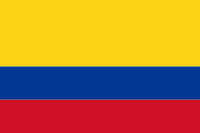- Colombian nationality law
-
Colombian nationality is typically obtained by birth in Colombia, birth abroad when at least one parent was born in Colombia, or by naturalization, after five years of permanent residence and meeting specific requirements.[1] It is defined in the 96th article of the Constitution of Colombia and the 1st Act of 2002.[2]
Contents
Nationality by birth
Everyone born in Colombia acquires Colombian nationality, as long as at least one parent is either a Colombian citizen or resident in Colombia.
A child born outside Colombia who has at least one Colombian parent can be registered as a Colombian national by birth, either upon returning to Colombia (for residents) or at a consulate abroad (for non-residents).
Nationality by naturalization
A person who has lived in Colombia as a permanent resident for five years may apply for naturalization at the Ministry for Foreign Affairs.[3] There are exceptions to the usual residence requirements in some cases, including:
- one year of residence for citizens of a Latin American or a Caribbean country;
- two years of residence for citizens of Spain;
- two years of residence for a person married to a Colombian citizen or who has Colombian children.
Dual nationality
Colombian nationality law acknowledges that a Colombian by birth or by naturalization can also possess another nationality.
Colombians who acquired Colombian nationality by birth cannot be deprived of it under any circumstances, so acquiring another nationality does not in itself result in the loss of Colombian nationality. A person who renounced their Colombian nationality may recover it later.
Colombian citizenship
As in most other Latin American countries, Colombia law differentiates between nationality and citizenship. Nationality is the attribute of the person in international law that describes his/her relationship to the State, whereas citizenship is given to those nationals (i.e. those that hold the Colombian nationality) that have certain rights and responsibilities before the State. The 98th article of the Colombian constitution establishes that Colombian citizens are those nationals that are 18 years of age or older.[4]
References
- ^ "Obtención de la nacionalidad colombiana por adopción" (in spanish). Ministerio de Relaciones Exteriores de Colombian. http://www.gobiernoenlinea.gov.co/tramite.aspx?traID=21. Retrieved 13 October 2010.
- ^ "Acto Legislativo 1 de 2002" (in spanish). Congreso de Colombia. 25 January 2002. http://www.secretariasenado.gov.co/senado/basedoc/cp/acto_legislativo_01_2002.html. Retrieved 13 October 2010.
- ^ "Ley 43 del 1 de febrero de 1993" (in spanish). Congreso de Colombia. 1st February 1993. http://www.secretariasenado.gov.co/senado/basedoc/ley/1993/ley_0043_1993.html. Retrieved 21 October 2010.
- ^ "Constitución Política de Colombia" (in spanish). Presidencia de Colombia. 1991. http://wsp.presidencia.gov.co/Normativa/Documents/ConstitucionPoliticaColombia_20100810.pdf. Retrieved 27th December 2010.
Nationality laws (category) By continent AfricaAsiaArmenia · Azerbaijan · Bangladesh · Bhutan · Burma (Myanmar) · China · Cyprus (Northern Cyprus1) · India · Indonesia · Iran · Iraq · Israel · Japan · Kazakhstan · South Korea · Lebanon · Malaysia · Mongolia · Nepal · Pakistan · Philippines · Russia · Singapore · Taiwan · TurkeyOceaniaEuropeAndorra · Austria · Belarus · Belgium · Bulgaria · Croatia · Czech Republic · Denmark · Estonia · Finland · France · Germany · Greece · Hungary · Iceland · Ireland · Italy · Kazakhstan · Latvia · Lithuania · Luxembourg · Macedonia · Malta · Moldova · Monaco · Montenegro · Norway · Netherlands · Poland · Portugal · Romania · Russia · Serbia · Slovakia · Slovenia · Spain · Sweden · Switzerland · Ukraine · United KingdomNorth AmericaSouth AmericaInternational
organizationsBy type Other Defunct Notes 1 Partially unrecognised and thus unclassified by the United Nations geoscheme. It is listed following the member state the UN categorises it under.Categories:- Colombian law
- Nationality law
Wikimedia Foundation. 2010.

